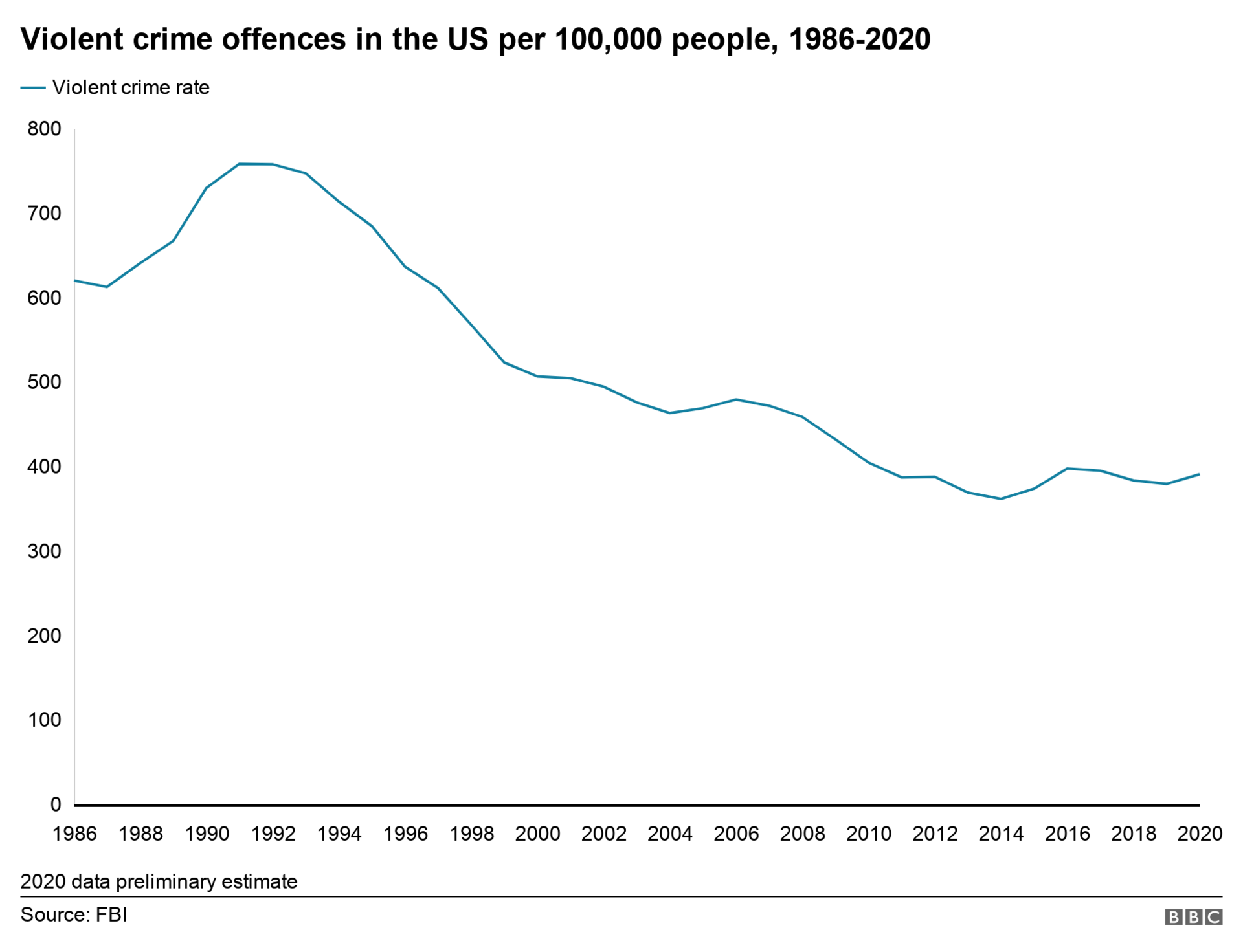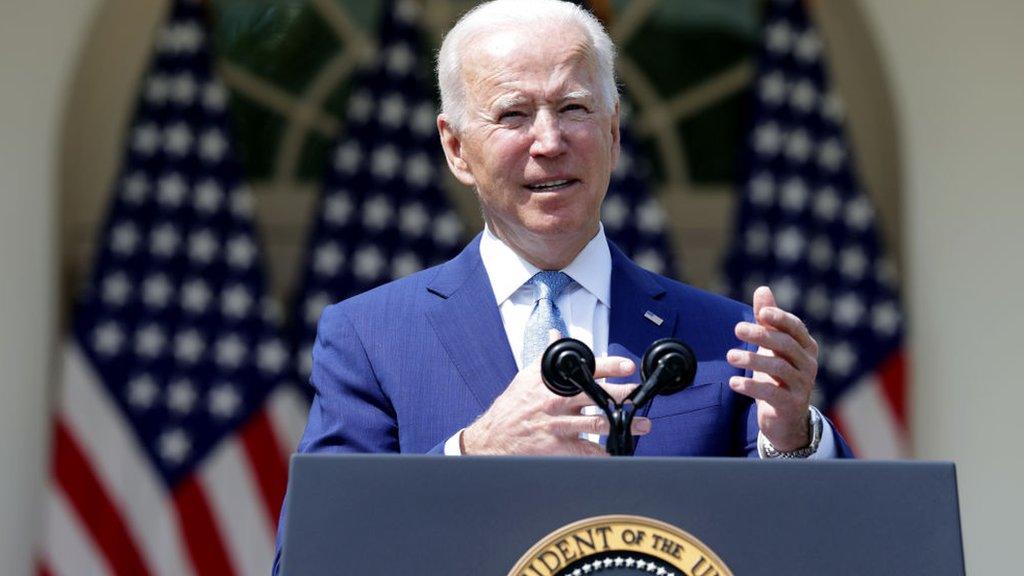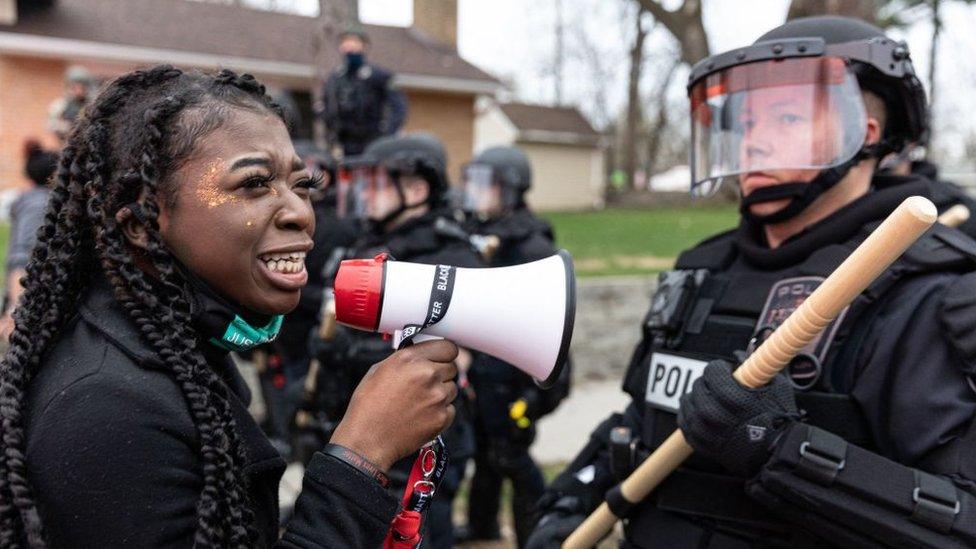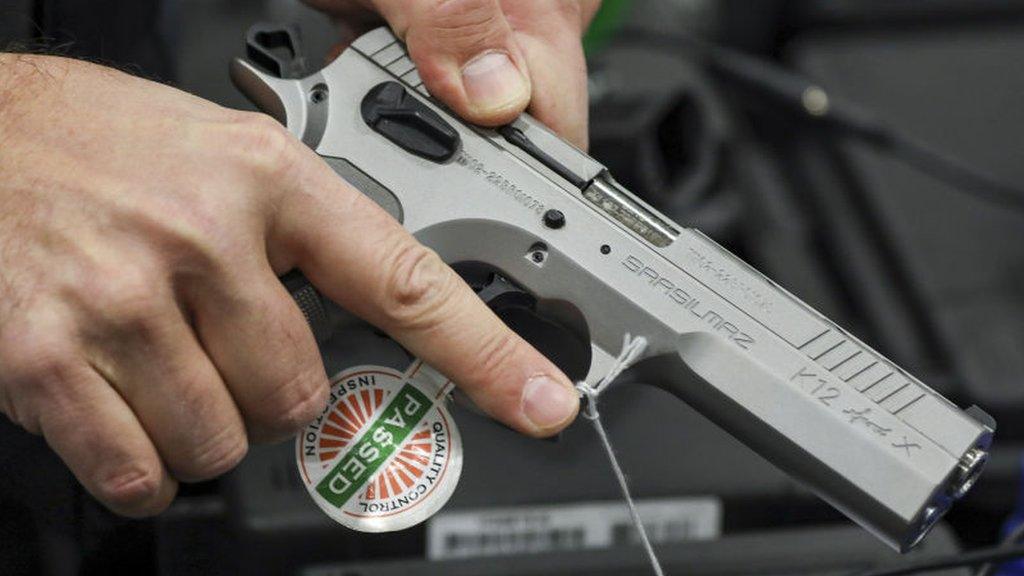Biden backs funding more police to fight crime wave
- Published
Watch Biden talk about the "blood of patriots"
President Joe Biden has unveiled a plan that includes funding more police to combat a nationwide surge in homicides, which he blamed on lax gun control.
He said officials in high crime areas can hire more law-enforcement personnel using coronavirus relief funding.
Mr Biden's crime-fighting strategy calls for curtailing rogue gun dealers and firearms trafficking.
Republicans are depicting Mr Biden's Democrats as weak on crime, amid calls by left-wingers to defund the police.
Announcing his five-point strategy at the White House on Wednesday, the president urged cities and states to use $350bn (£250bn) of funding from a Covid-19 relief bill on public safety efforts, including adding more police officers, even beyond pre-pandemic levels.
"It means more police officers, more nurses, more counsellors, more social workers or community violence interrupters to help resolve issues before they escalate into crimes," the president said.
Some members of Mr Biden's party have amplified calls by Black Lives Matter activists to defund the police, though the president himself has resisted the slogan, which is unpopular with most voters.
Mr Biden - who as a senator wrote a 1994 crime bill widely blamed for mass incarceration of black people - said on Wednesday: "This is not a time to turn our backs on law enforcement or our communities."
Unless tamed, the crime wave is likely to become a major issue ahead of next year's congressional mid-term elections.
During his remarks at the White House, the president also took aim at armed insurrectionists, saying they would "need F-15s and maybe some nuclear weapons" to take on the US government.
The Biden administration has proposed gun control as a remedy for violent crime, although Democratic bills in Congress to limit Americans' access to firearms have been blocked by Republicans.
The administration's strategy also proposes investing in community violence intervention programmes, employment opportunities and summer activities for teenagers and young adults, and support for formerly incarcerated Americans re-entering their communities.
The president recently hosted several big city mayors at the White House for a discussion on crime prevention.
Why is the US seeing more violence?
In March, the FBI released preliminary 2020 statistics showing a significant jump - 25% - in murders from the year before. So far, the upward trend has continued into 2021.
The bureau will release its official numbers in September. If early projections bear out, it will be one of the largest homicide increases ever reported.
"This was a large scale national increase in violence," Jeff Asher, co-founder of AH Datalytics and a former analyst for the CIA and Department of Defense, told the BBC.
Some analysts have blamed the wave of homicides on the Covid-19 pandemic, although research indicates, external that global crime rates outside the US fell or were stable amid all the lockdowns.
Other analysts see the cause as low police morale after the murder of George Floyd last year in Minneapolis, Minnesota, and the ensuing civil unrest that swept US cities.
A University of Utah study pinpointed, external the spike in US homicides to late May 2020, when Mr Floyd was killed by an officer.
But even with this steep rise, the murder rate is still far lower than in the early 1990s, when it was almost double the current figure.
And crime overall - including rapes, robbery and other property crime - dropped by about 6% in 2020, among the largest decreases on record.


Fund the police

There are a few political issues that, when they reach a boiling point, crowd out just about every other subject in national discussion.
The economy is one. Crime is another.
And while things seem to be looking fairly good for Joe Biden on the former, an uptick in violent crime could be a serious challenge for Democrats ahead of next year's mid-term elections.
Criminal statisticians will point out that the current murder rates are still low compared to previous decades, including the 1990s, when Biden - then a senator - made "getting tough on crime" one of his top issues.
The general public, however, typically doesn't have such long-term perspective.
Republicans have offered an explanation - that the anti-law-enforcement rhetoric and "defund the police" efforts from last year's Black Lives Matters demonstrations have led to the current situation.
On Wednesday, Biden offered a counter-argument, that lax gun regulations are to blame, creating an environment where even minor arguments can turn deadly.
He also promised to boost funding for the police - a move that may anger some on the left.
With an eye on 2022, however, the White House may be calculating that inoculating itself from Republican attacks is worth the risk of intra-party unrest.

Gun sales increased last year, as did reports of domestic violence. According to Mr Asher, there was also evidence that Americans carried firearms more frequently in 2020.
Data on the causes of murders in 2020 is not yet widely available, Mr Asher said, but in 2019, 74% of homicides were gun-related.
On the eve of Mr Biden's speech, the Department of Justice announced a new team aimed at tackling gun trafficking in New York, Chicago, Los Angeles, Washington DC and San Francisco.
In New York City, Democratic politicians vying to become the next mayor have largely focused on the issue of law and order, which was widely condemned as a racial dog whistle when it was the theme of Republican former President Donald Trump's election campaign. Ex-police officer Eric Adams is currently in the lead as results are being tallied.
What's at stake in the NYC mayoral election? New Yorkers explain.
Related topics
- Published9 April 2021

- Published21 April 2021

- Published17 December 2024
